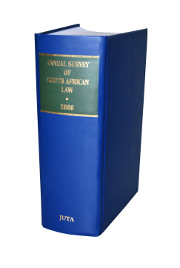The Law of Evidence

The Law of Evidence
Authors Pamela-Jane Schwikkard
ISBN: 978 1 48513 300 1
Affiliations: Professor in Law, University of Cape Town
Source: Annual Survey of South African Law, 2015, p. 906 – 917
Abstract
None

ISBN: 978 1 48513 300 1
Affiliations: Professor in Law, University of Cape Town
Source: Annual Survey of South African Law, 2015, p. 906 – 917
None

ISBN: 978 1 48513 300 1
Affiliations: Senior Professor in the Department of Private Law, University of the Free State, Bloemfontein; Professor in the Department of Private Law, University of South Africa, Pretoria
Source: Annual Survey of South African Law, 2015, p. 805 – 905
None

ISBN: 978 1 48513 300 1
Affiliations: Senior lecturer in the Department of Mercantile Law, Unisa
Source: Annual Survey of South African Law, 2015, p. 685 – 804
None

ISBN: 978 1 48513 300 1
Affiliations: Professor of Intellectual Property Law in the Department of Mercantile Law, University of South Africa, Pretoria; Professor of Intellectual Property Law in the Department of Mercantile Law, University of South Africa, Pretoria
Source: Annual Survey of South African Law, 2015, p. 660 – 684
None

ISBN: 978 1 48513 300 1
Affiliations: Professor of Private Law, University of Johannesburg
Source: Annual Survey of South African Law, 2015, p. 611 – 659
None

ISBN: 978 1 48513 300 1
Affiliations: Professor, Faculty of Law NWU Potchefstroom Campus
Source: Annual Survey of South African Law, 2015, p. 551 – 610
None

ISBN: 978 1 48513 300 1
Affiliations: Attorney and Conveyancer of the High Court of South Africa; Professor of Law, University of KwaZulu-Natal
Source: Annual Survey of South African Law, 2015, p. 497 – 550
None

ISBN: 978 1 48513 300 1
Affiliations: Professor of Banking Law, University of South Africa, Pretoria. Professor Schulze contributed the section on Financial Institutions; Attorney of the High Court of South Africa; Associate Professor of Law, University of South Africa, Pretoria
Source: Annual Survey of South African Law, 2015, p. 435 – 496
None

ISBN: 978 1 48513 300 1
Affiliations: Professor of Law in the Department of Private Law, University of South Africa
Source: Annual Survey of South African Law, 2015, p. 393 – 434
None

ISBN: 978 1 48513 300 1
Affiliations: Professor of Law, University of KwaZulu-Natal
Source: Annual Survey of South African Law, 2015, p. 378 – 392
None